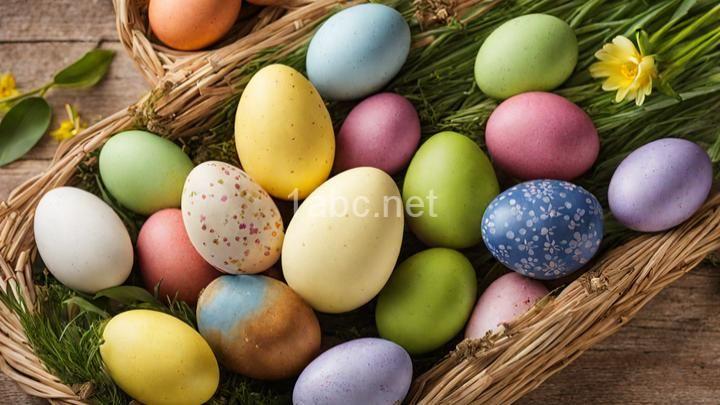Uncovering the Origins of Easter Traditions

Introduction:
Hey there, lovely readers! Welcome to another exciting blog post where we dive deep into the fascinating world of Easter traditions. Easter, a holiday celebrated worldwide, holds a special place in the hearts of many. It's a time of joy, renewal, and community. Today, we'll be taking a closer look at the origins of Easter traditions, exploring the history, symbolism, and cultural significance behind this beloved holiday. So, grab a cup of tea, get cozy, and let's embark on this enlightening journey together!
I. The History of Easter:
To truly understand the origins of Easter, we must travel back in time to ancient civilizations. Easter, also known as Pascha, has its roots in both pagan and Christian traditions. The word "Easter" itself is derived from the Old English word "Ēastre," which is believed to be named after the Anglo-Saxon goddess of spring and fertility.
Over the centuries, Easter has evolved and become intertwined with various cultures and religions. In ancient times, numerous civilizations celebrated the arrival of spring, a season symbolizing rebirth and renewal. These festivities often included rituals and ceremonies to honor nature's cycle of life. As Christianity spread throughout Europe, the early Christian church adapted these existing traditions and incorporated them into their own Easter celebrations.
II. The Symbolism Behind Easter Eggs:
Now, let's crack open the fascinating history of Easter eggs! Eggs have long been considered symbols of fertility and new life in many cultures. The ancient Persians, Egyptians, and Greeks all believed that eggs held powerful symbolism. These civilizations associated eggs with the concept of creation and believed that life emerged from them.
So, how did eggs become associated with Easter? Well, it's believed that early Christians in Mesopotamia began dyeing eggs red to symbolize the blood of Christ. Over time, this practice spread to other regions, and different colors and patterns were introduced. Today, beautifully decorated Easter eggs have become an iconic symbol of the holiday, representing new beginnings and the joyous arrival of spring.
III. The Story of the Easter Bunny:
Hop along now, as we delve into the enchanting folklore surrounding the Easter bunny. The Easter bunny, an adorable fluffy creature, has become synonymous with Easter celebrations. But where did this lovable character come from?
The Easter bunny has deep roots in pagan traditions, particularly in German folklore. In ancient times, rabbits were associated with fertility and abundance, as they are known for their prolific breeding. As Christianity spread, the pagan symbol of the rabbit was adopted by early Christians, who saw it as a representation of new life and resurrection.
IV. Traditional Easter Foods:
Get your taste buds ready as we explore the mouthwatering world of traditional Easter foods! Easter is a time for indulgence and feasting, and different cultures have their unique culinary delights to mark this joyous occasion.
In Greece, a traditional Easter dish called "Magiritsa" takes center stage. This hearty soup is made from lamb offal, lettuce, onions, and herbs. It is often enjoyed after the Midnight Easter Mass, symbolizing the end of the Lenten fasting period.
Meanwhile, in Italy, a popular Easter treat is the "Colomba di Pasqua," a dove-shaped sweet bread adorned with almonds and sugar. This delicious bread is a symbol of peace and purity, reminiscent of the dove that Noah sent to find land after the Great Flood.
V. Religious Observances:
Let's take a moment to appreciate the religious observances that make Easter such a significant time for Christians worldwide. Easter is not just about bunnies and eggs; it holds immense religious importance.
The period leading up to Easter, known as Lent, is a time of reflection, fasting, and penance. It lasts for forty days and symbolizes the forty days Jesus spent fasting in the wilderness.
Palm Sunday, which falls on the Sunday before Easter, commemorates Jesus' triumphant entry into Jerusalem. People wave palm branches to honor this momentous event.
Good Friday, observed on the Friday before Easter Sunday, is a day of solemn remembrance of Jesus' crucifixion. Christians reflect on the sacrifice made by Jesus for the redemption of humanity.
Finally, Resurrection Sunday, also known as Easter Sunday, celebrates the resurrection of Jesus Christ from the dead. It is a day of joy and hope, symbolizing victory over sin and death.
VI. Modern-Day Traditions:
Now, let's fast forward to modern times and explore the vibrant customs associated with Easter. Easter has evolved into a time for families to come together, creating cherished memories and participating in joyous activities.
One beloved tradition is the Easter egg hunt. Children excitedly search for hidden eggs, filling their baskets with colorful treasures. It's a delightful game that brings laughter and joy to households worldwide.
Another popular tradition is the Easter parade. Communities gather to showcase their creativity by donning elaborate Easter bonnets and outfits. These parades are a feast for the eyes, as people proudly display their unique creations.
Easter brunches and family gatherings are also common during this time. Loved ones gather around the table to enjoy a scrumptious meal, exchange stories, and create lasting memories.
Conclusion:
As we conclude our journey through the origins of Easter traditions, it's apparent that this holiday holds a rich tapestry of history, symbolism, and cultural significance. Easter is a celebration that beautifully blends ancient customs with religious observances and contemporary traditions.
Let's embrace the diversity of Easter traditions, cherishing our own unique customs while appreciating the vibrant tapestry of celebrations worldwide. Whether you're dyeing eggs, indulging in delicious food, or reflecting on the religious aspects of Easter, may this holiday be filled with love, joy, and renewal.
Closing Remarks:
Thank you, dear readers, for joining us on this enlightening exploration of Easter traditions. We hope you found this blog post informative and entertaining. We would love to hear your thoughts and experiences related to Easter traditions, so please feel free to leave a comment below. Wishing you a delightful Easter filled with love, laughter, and delightful surprises!
FREQUENTLY ASKED QUESTIONS
What is the purpose of Uncovering the Origins of Easter Traditions?
The purpose of uncovering the origins of Easter traditions is to gain a deeper understanding of the historical and cultural significance behind these practices. By delving into the roots of Easter customs, we can appreciate the diverse influences that have shaped this celebration over time. This exploration allows us to connect with our ancestors and appreciate the rich tapestry of traditions that have been passed down through generations. Additionally, understanding the origins of Easter traditions can help us separate fact from fiction and dispel any misconceptions or myths surrounding this holiday. Overall, the purpose is to foster a sense of cultural appreciation and enhance our enjoyment of Easter festivities.
Why is it important to learn about the origins of Easter traditions?
It is important to learn about the origins of Easter traditions for several reasons. First and foremost, understanding the historical background of these traditions allows us to appreciate their significance and meaning. By delving into the origins of Easter, we gain a deeper understanding of the cultural and religious roots that have shaped these traditions over time.Learning about the origins of Easter traditions also helps us to debunk misconceptions and dispel myths that may surround them. There are often various interpretations and stories associated with Easter, and by learning about its origins, we can separate fact from fiction and gain a more accurate understanding of the holiday.
Furthermore, studying the origins of Easter traditions allows us to connect with our ancestors and appreciate the continuity of these customs across generations. It provides a sense of cultural heritage and identity, fostering a stronger connection to our past.
Additionally, exploring the origins of Easter traditions can be a fascinating journey into history, folklore, and symbolism. It allows us to explore the diverse ways in which different cultures have celebrated this holiday throughout history, shedding light on the rich tapestry of human traditions and beliefs.
Overall, learning about the origins of Easter traditions offers us a chance to deepen our understanding of this important holiday, appreciate its historical and cultural significance, and foster a greater sense of connection to our past. So, let's dive into the fascinating world of Easter traditions and discover the stories behind them!
How do you research the origins of Easter traditions?
To research the origins of Easter traditions, there are a few approaches you can take. Here's a step-by-step guide to help you out:
-
Start with historical accounts: Look into historical texts, documents, and records that mention Easter traditions. This can include ancient writings, religious texts, and even early Christian literature.
-
Dig into cultural and religious sources: Explore the traditions associated with Easter in different cultures and religions. This can provide insights into the origins and evolution of specific Easter customs. For example, you might look into the practices of early Christians, the influence of pagan festivals, or the significance of certain symbols like eggs or bunnies.
-
Consult academic research: Scholarly articles, books, and academic journals can offer in-depth analysis and research on the origins of Easter traditions. Look for studies conducted by historians, anthropologists, or religious scholars who have explored the topic.
-
Visit museums and exhibitions: Museums often have exhibits on Easter traditions, showcasing artifacts and providing historical context. Take advantage of these resources to gain a firsthand understanding of the origins and development of Easter customs.
-
Talk to experts: Reach out to experts in the field, such as historians, religious leaders, or cultural anthropologists. They may be able to provide valuable insights and point you towards additional resources.
-
Utilize online resources: The internet can be a treasure trove of information. Look for reputable websites, online archives, and digital libraries that focus on the history and origins of Easter traditions.
Remember, researching the origins of Easter traditions can be a fascinating journey, but it's important to critically evaluate your sources and cross-reference information to ensure accuracy. Happy researching!
Are the origins of Easter traditions well-documented?
The origins of Easter traditions are not well-documented, as they have evolved over centuries and draw from various cultural and religious influences. While some aspects of Easter can be traced back to ancient pagan celebrations of spring, the Christian observance of Easter as the resurrection of Jesus Christ has its roots in the New Testament of the Bible. The exact origins of customs like Easter eggs, bunnies, and the Easter basket are less clear, with theories pointing to ancient fertility symbols, medieval traditions, and even German folklore. Overall, the history of Easter traditions is a fascinating blend of different cultures and beliefs, but the specific origins can be somewhat elusive.
